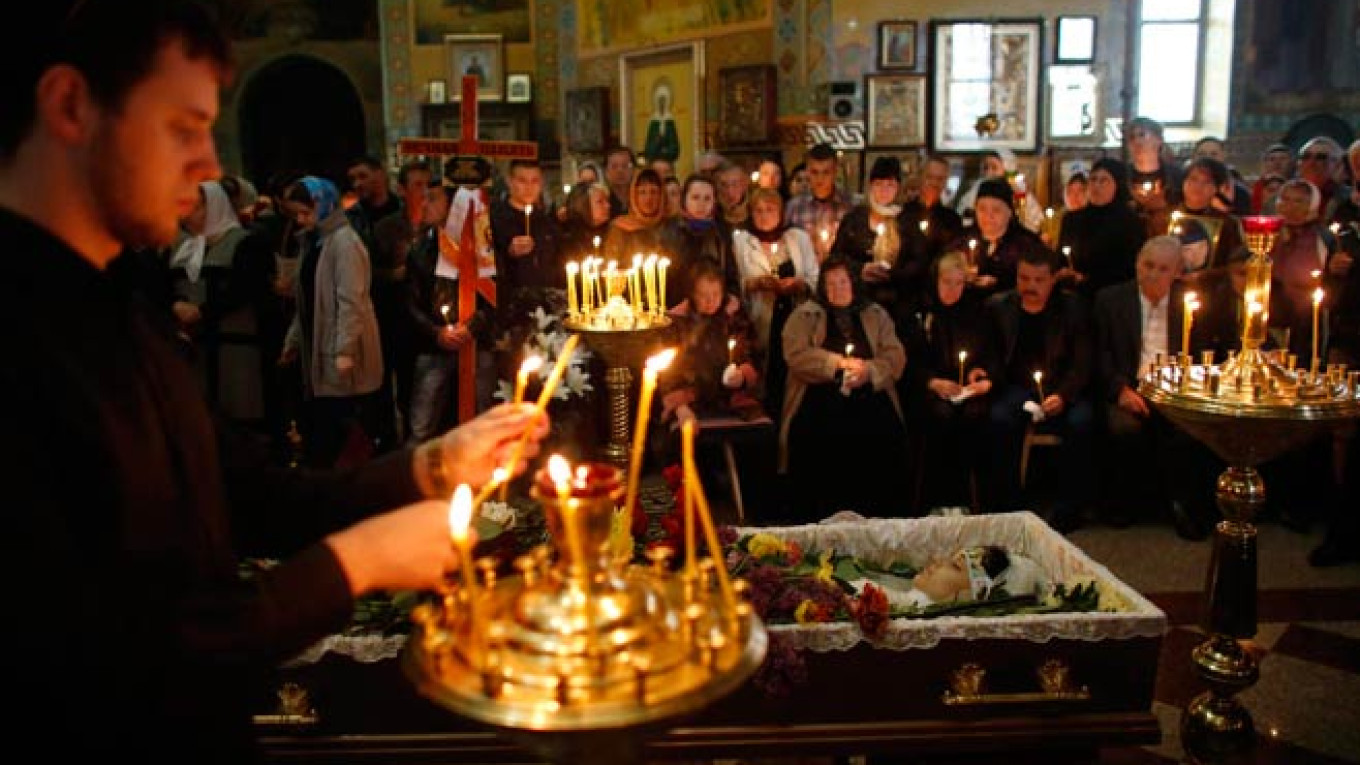If Kramatorsk needed a martyr, it has one now — a 21-year-old nurse called Yulia Izotova, killed on Saturday, buried on Monday.
"The driver thought she was unconscious," said her best friend, Lena. "But when they reached the hospital, she was pulled out dead."
Shot in the back by what friends and relatives say were large-caliber bullets fired from a column of Ukrainian armor as she travelled by car after dark between rebel-held towns, Izotova joined a small but growing list of dead in this mining region's month-old uprising.
Though in life she played no active role in the conflict, her open coffin was brought to Kramatorsk's central square and laid at the foot of the town hall, occupied by gunmen who say they would rather secede from Ukraine than live under a government in Kiev that has chosen Europe over Russia.
Hundreds gathered to pay their respects, in a scene that recalled late February in Kiev, when coffin after coffin was borne through a crowd on the Maidan, the capital's central square, carrying the victims of gun battles with police defending Moscow-backed President Viktor Yanukovych.
In Kiev, the crowd bayed for revenge, and Yanukovych fled the next day. Ukraine looked westward. But little more than two months later, this country of 45 million is sliding toward civil war, the cycle of violence fast extinguishing any hope of a political resolution.
"They shoot at us. Why? Because we do not want to live with fascists?" asked 58-year-old passport photographer Sergei Forminski, standing with his wife among the mourners. "We are not slaves; we kneel to no one."
The coffin was carried through streets stilled by barricades of tires and trees, into the town's Holy Trinity Church, where seven priests led the many mourners in prayer. Scattered red carnations traced the route.
Opinions as to what should happen here vary, more than the catch-all terms "pro-Russian" and "separatist" might suggest.
But if some were once preaching moderation, for a future still within Ukraine, with each death they are fast being drowned out by those calling for this southeastern steel and coal belt to break away altogether after a referendum on Sunday that is being organized by anti-Kiev activists.
Denis Pushilin, leader of the self-proclaimed Donetsk People's Republic in the regional capital, was not wrong when, in the wake of a Ukrainian military advance against the rebel stronghold of Slovyansk last week, he warned: "The more blood that flows, the less the chance of a united Ukraine."
'Never Forgive'
Torn between a resurgent Russia and its Cold War adversaries, at the core of the crisis unfolding in Ukraine are differences of culture, history and identity, the result of borders drawn up by Bolshevik commissars fusing territory that was mostly part of Russia since the Middle Ages with provinces that were once part of Poland or the Austrian empire.
Those differences are arguably less pronounced than those of ethnicity and religion stoked by nationalists to tear apart Yugoslavia in the 1990s, killing more than 100,000 people.
But blood begets blood, and that is how wars begin.
Deaths such as those in Odessa on Friday, when dozens of pro-Russian activists perished in a burning building during fierce street clashes in the Black Sea port, have injected new venom to the conflict. It has triggered appeals for help to President Vladimir Putin — and calls for revenge.
"I am of two bloods, Ukrainian and Russian," said Forminski, the photographer. "Who says we want to join Russia and Putin?
"It is a lie. We just want to live in peace, not with fascists."
"They took the first step to split the country," he said of the new leadership in Kiev, citing the overthrow of Yanukovych and the new government's swift embrace of the U.S. and European Union over the objections of the east, whose industry is closely tied in with trading partners in Russia.
Here in the east, the new government is seen as rooted in nationalism, hostile to Russians and their history.
Mikhail, a 55-year-old former sailor in the port of Mariupol, was another who sees secession as a last resort: "I am Ukrainian. Let it be Ukraine, but without that government. Otherwise, we will go with Russia. It is the lesser of two evils."
What happens after the May 11 vote is unclear. Whatever the result of the referendum, Kiev will not recognize it.
Russia has yet to intervene, at least officially. Ukraine says it is already orchestrating the uprising with men and arms, a charge the Kremlin denies having already annexed Crimea in the wake of Yanukovych's overthrow.
Russia says it reserves the right to defend ethnic Russians beyond its borders. Critics believe it may satisfy itself with a neighbor in turmoil, federalized or split and so unable to join NATO or the EU. It might not be enough for Kramatorsk.
"We will never forgive them for this," said a rebel called Ruslan, as he gazed over the mourners for Yulia Izotova.
"For 100 years, the southeast will remember this."


